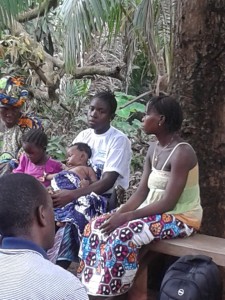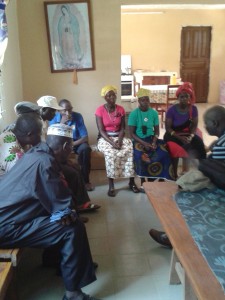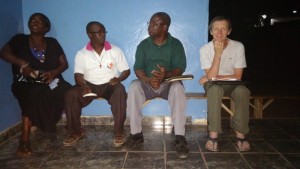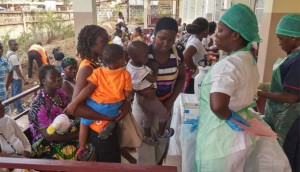May-June 2015
Support for 400 Family Units
 The month of May witnessed the beginning of the project to provide support to family groups selected on the basis of their vulnerability, a state indicated by low economic incomes (less that $2 a day and the number of orphans caused by Ebola). The selections was carried out by 22 community-based psycho-social support facilitators (CBPSF) who completed the first part of their training and have thus began its practical part, one involving actual experience.
The month of May witnessed the beginning of the project to provide support to family groups selected on the basis of their vulnerability, a state indicated by low economic incomes (less that $2 a day and the number of orphans caused by Ebola). The selections was carried out by 22 community-based psycho-social support facilitators (CBPSF) who completed the first part of their training and have thus began its practical part, one involving actual experience.
This support for family units has two goals. On the one hand, it seeks to facilitate their resilience, helping the process of the move from a situation of mourning to a return to their functions inside the family structure and within society, in a harmonious process that does not jump the various stages but helps to integrate them. From a psychological point of view, indeed, these two months of meetings have brought out the extreme weakness and frailty linked above all else to the death of numerous loved ones; to the speed of the event of Ebola which took them by surprise and impeded the process of their final farewells; and to the impossibility – in many cases – of providing a decent burial (often many people do not even know the place of burial of their relatives) to their loved ones, thereby failing to live up to a cultural duty. Past traumas open up cloudy prospects for the future, above all as regards a capacity to face up to support for family units which are often diminished as regards their economically productive components and expanded as regards their dependent members (children). This problem is felt in an acute way by those women who have been left on their own with a large number of children (their own and orphans). But this is equally evident with males because of an inability to support dependent children who are still alive.
Nonetheless, the first two months have also revealed a ‘natural’ resilience in the form of extended families and the solidarity of members of the same villages. These are unsuspected resources that can play an important role in the process that involves the overcoming of the trauma that the many deaths caused by Ebola have left behind them.
Support for these 400 families has also been achieved in a very practical way through awareness of a hierarchy of needs that cannot forget such basic requirements as alimentation, health and the right to study. During the post-Ebola stage the local government has been trying to meet the needs of the population by abolishing school fees and assuring free treatment for Ebola survivors in an attempt to restart the social system. But good intentions do not always keep up with a reality which does not stop posing challenges to citizens, such as difficult access to education – this is because many schools are ‘community’ schools and do not belong to the public system or receive public funding, and also to health care. This last is caused by a real inability of the system to control what is taking place in the thousands of peripheral health units that are entrusted with providing health to citizens: they themselves lack the resources to provide universal health coverage! For this reason, every month the project offers to each of the receiving families a sum that can deal with expenses that are otherwise neglected. During these two months sums corresponding to a €19,925 for the conditional cash transfer (€20 a family) have been distributed during the monthly mutual help meetings. This sum includes the CCT of the month of July given to families from eight villages that are inaccessible during the rainy season. For these families, the monthly meetings will begin again in September. A little more than 40% of this sum is financed by the Italian Bishops’ Conference and the rest from our own funds and from bodies that work with us.
Supervision of the Activities of the CBPSF
The aim of the project is to create structures that provide psycho-social support through the utilisation of human resources. In simple terms, the goal is to assure the presence of CBPSF who are able to support the victims in the difficult process of the management of mourning and this to the point of achieving resilience. In the month of May – after the first stage of theoretical training had been completed – the CBPSF began their activities in their respective local areas which were defined as being within the boundaries of the parishes to which they belonged. These activities involved individual support for family units that had been defined as being vulnerable and took the form of nearness and listening (counselling). In addition to individual support, the CBPSF have organised monthly meetings for mutual help which adopt the philosophy of the value of a homogenous group in providing mutual support. Lastly, the CBPSF have had to draw up a monthly ‘case management report’ which is used to monitor the level of efficiency of what is done and levels of assimilation as regards relational skills.



During the month of May the mutual help groups provided the basis for an assessment of the capacities of the CBPSF. A mutual help group is an opportunity to share within that group certain common problems, searching within that group for support, if not, indeed, a solution. The CBPSF have performed the task of organising the meetings and of guiding them. In this they have demonstrated a capacity for organisation, creativity, interest in the beneficiaries and links with these last in terms of sensitivity and listening. This has been a trial means by which to begin a first assessment of the selected group, albeit taking into account that skills as regards individual listening, on the one hand, and group animation, on the other, are different. Nonetheless, it has been possible to have a primary picture. In order to carry out this assessment, we took part in all the monthly meetings organised in the twenty areas of the diocese of Makeni, being careful beforehand to draw up a calendar of meetings that would allow the participation of a CTF field worker and supervisor at the same time. on two occasions it was necessary to divide tasks for a contemporaneous implementation of two programmes in two different localities. During these meetings we focused our attention on the performance of the CBPSF which was assessed on the basis of certain parameters: the organisation and facilitation of the event; leadership and a capacity to take decisions; relational skills (focusing on problems; an ability to produce a synthesis and stimulate further sharing; the oral expression of feelings; the proposing of solutions); and other elements that may emerge from taking part in the group. At the end of each group we stayed with the CBPSF for an assessment in which we sought to bring out the positive and negative aspects that had been encountered in the animation of the group, thereby providing an initial feedback to the CBPSF. These initial assessments were then crystallised into a written report which are a part of their assessment so that at the end of the nine months of ‘work placement’ it will possible to have a picture of the human resources that are available on the basis of the services offered. Taking part in the groups also brings out an important picture of suffering and malaise that requires targeted initiatives for which often that CBPSF are not trained. The assessment at the end of each meeting became an opportunity to plan the next one and to provide information and training material designed to facilitate this task. Through the supply of other material on theoretical training it has been possible to supplement the basic training received during the month of April and assure a minimum of ongoing training.



Lastly, a further element of assessment has been readiness and speed in presenting the case management report, an instrument of analysis of relational and analytical capacity (reading of the context) of a CBPSF. The drawing up of the case management report began in the month of May and at the moment of this report two were handed over/drawn up! Most of the CBPSF are in line with the work envisaged. The assessment of the contents will entrusted to trainers during the course of intermediate training that will take place in September.
Economic Support for the CBPSF and the Supervisors
Although this is administrative activity, it was completed punctually and with precision, taking into account – on a few occasions – possible requests for changes raised by the CBPSF. These have prevalently related to the relative cost of movements to reach the family units that benefit from the initiative. Indeed, on some occasions they are distant from the location of the CBPSF and this increases expenses. Given that this is an unpredictable heading, it was decided to meet the (few) requests of these people, aware that doing the opposite would have had a negative effect on the wellbeing of the families benefiting from the initiative who would have been deprived of the emotional support offered by the CBPSF. In addition, it has been possible to meet this ‘expense’ without changing the budget because the number of CBPSF has been reduced to three compared to what was originally envisaged! Although limited, this economic support assures a small income and motivates the CBPSF to carry on with their service and to recognise its importance!
The supervisor plays an important linking role between the CTF field worker, the CBSF and the beneficiaries and not only at the level of knowledge of local languages and culture. The supervisor is one of the few experts on mental health in Sierra Leone and knows how to guide the group with competence and assertiveness, being acknowledged and accepted as such.
Strengthening the Basic Health-Care Structures (PHUs)



During the month of June concrete initiatives were begun by trying to use the time available to the utmost before the rainy season made all building work impossible, with a consequent postponement of everything to the dry season after September. Unfortunately, the Camillian Task Force was not able to do everything that it had planned for this month because of delays caused by its partners. The CTF, however, was able to finalise the estimate for the health-care material for the PHUs, a purchase that will be carried out during the month of July. It continued to set in motion the activities for the establishment of the WASH system, partly meeting the costs for the digging of two wells located in Masimera and Royaben. Lastly, agreement was reached on 60% of the contents and the calendar of the training that will be offered to the personnel of the PHUs as a part of the project to strengthen their skills and capacity to ensure a competent and safe service. The courses offered will be given starting in September – a season when it will be more easy to move after the rains of July and August , and it will be able to rely upon local personnel, on personnel sent there for other courses, and on the cooperation of public institutions entrusted with such tasks. The fourth two-monthly period (July-August), although obstructed by the rains, should witness the end of these building works and the consignment of the health-care material designed to make the 6 PHUs safe settings for health care!





